I Asked Financial Coaches How To Stop Beating Myself Up About Money And Here's What They Had To Say
When it comes to personal finance, we’re often our own worst enemies. We may shame and belittle ourselves, and it becomes a vicious cycle. We say we can’t manage money, and then we don’t. And when bills come due and we overdraw the accounts, it becomes a self-fulfilling prophecy: I am bad with money.
ABC / Via giphy.com
But are we actually bad with money, or is it something more rooted in psychology?
I sat down with financial coaches Mel Dorion from Modest Millionaires, and Jess from The Fioneers to talk about it. They both said that people’s ability to handle money well has less to do with their skill set and more to do with their mindset. Many of us hold limiting beliefs that affect the way we handle money and keep us from living our best financial lives.

Limiting beliefs are beliefs you have about yourself that stop you from achieving something. They might sound like, “I’m not good with money,” or, “I don’t deserve that promotion, so I’m not going to ask for it,” or, “I’m too young to start a business,” or, “I can’t invest because I’m not smart enough.” Any negative thing that you believe about yourself can be a limiting belief because it stops you from reaching your full potential as a person.
Coming face to face with our limiting beliefs can be hard, says Mel Dorion, who semi-retired at 33 and spends her time coaching people on their money. But it’s important to acknowledge them and work through them. And it’s important to not shame yourself for having them. Everyone has limiting beliefs, even famous people, because they’re tied to our natural instinct to survive. But in order to thrive, we need to come face to face with them.

A lot of limiting beliefs come from our experiences and how we saw our parents live. We might be afraid of not having enough if our parents lived it. Or if our parents had a lot, we can be afraid that we’re taking away from someone who has less than us. These beliefs are often so deeply rooted in the ways that we were raised and the cultures we come from that we don’t even notice they’re there.
DIVE Studios / Via giphy.com
If you want to do something but feel like you’re not capable of doing that thing, you’ve just found a limiting belief. As humans, we’re capable of far more than we give ourselves credit for, and it’s important to be able to dismantle these limiting beliefs to create a more accurate self-image.
When you come across negative self-talk surrounding money, it’s important to ask yourself why you think that, says Jess, who left her job in HR to run The Fioneers full time and also coaches people on money. Some limiting beliefs are triggered by looking at people 5 to 10 years ahead of us, and others are triggered by false narratives we tell ourselves about money. Asking why is the first step to challenging that belief.
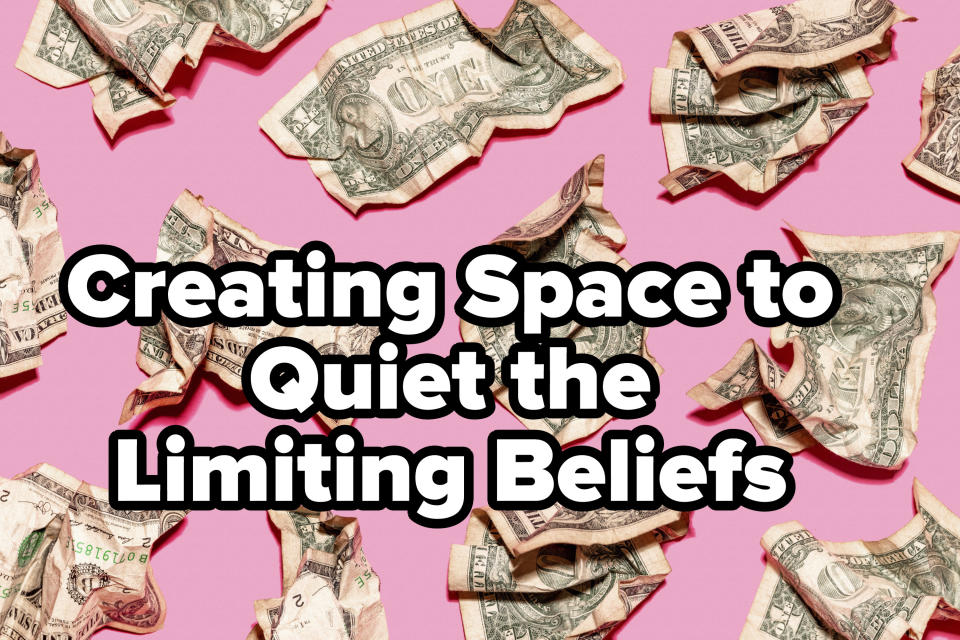
Mel stressed that in order to reframe your limiting beliefs into empowering ones, you have to create a margin in your life to deal with them. It’s hard to get past your limiting belief when you’re inundated with the work culture that’s prevalent in the western world.
“Your employer doesn’t want you to have time to think and challenge those beliefs about yourself,” Mel said. “You need recovery in the background and space to work though those limiting beliefs.”
Paramount Pictures / Via giphy.com
“You’ll do your best work if you’re well, balanced, and focused on recovery. You’ll end up making more if you take time to take care of yourself,” Mel said.
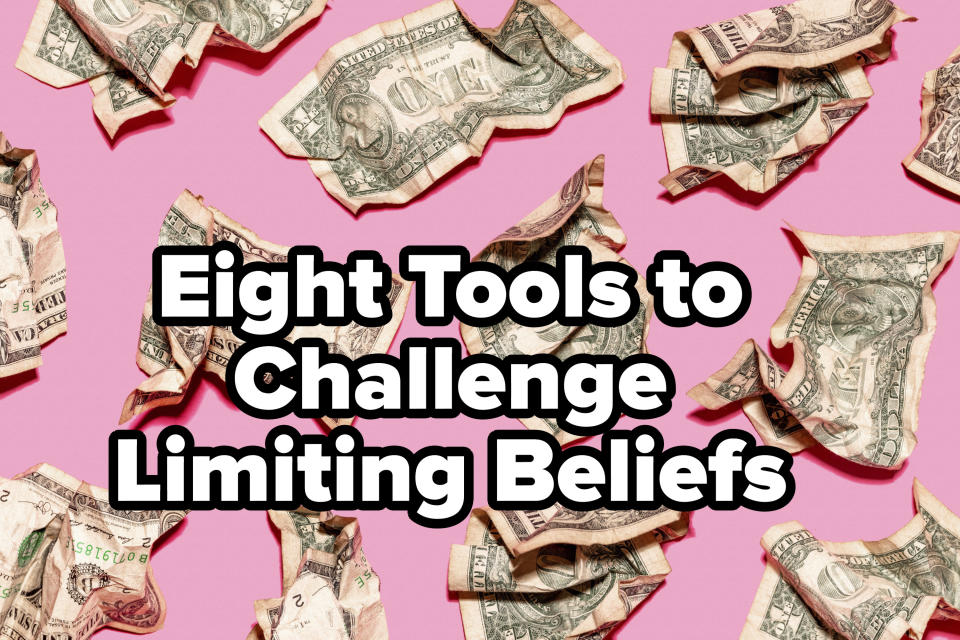
When you give yourself space to challenge your limiting beliefs, you’ll be more able to start living the life you want to lead, and not feeling stuck where you are now. In Jess’s program, she has her clients work through several steps to help reframe limiting beliefs into empowering beliefs.

The more you can figure out what the limiting belief actually is, the easier it will be to reframe it. And she stressed that the more specific you can be, the better. For example, “I’m not good at money” is a limiting belief, but if you can figure out why you think that and drill down on that limiting belief, to say instead, “I’m not good at money because I grew up poor and don’t feel confident in my skills” changes the game some.

Can you take that limiting belief and rewrite it into an empowering belief that convinces you? If my limiting belief is “I shouldn’t ask for the raise because I don’t deserve it,” I could flip the script and say, “I do deserve the raise because I’m a qualified employee.” If you believe it, congrats; this skill worked for you. If you didn’t, that’s OK. There are plenty of other tools in your toolbox.

Jess stresses that you should look both at the evidence for the limiting belief and against it. If I have a limiting belief that I’m not valued enough to ask for the raise, I might look at the time that I asked for a raise at an old job and was told no. Jess would argue that there were extenuating circumstances around that particular scenario, and it doesn’t reflect your self-worth or even future outcomes.
Now, let's say I'm at a completely different job with a completely different boss. And I’ve been crushing it at work. There is hard evidence against the idea that I don’t provide value. If this sounds like you, you might also want to do some work that separates your value from your job, since you’re a whole person and not just an employee.
paramount plus / Via giphy.com
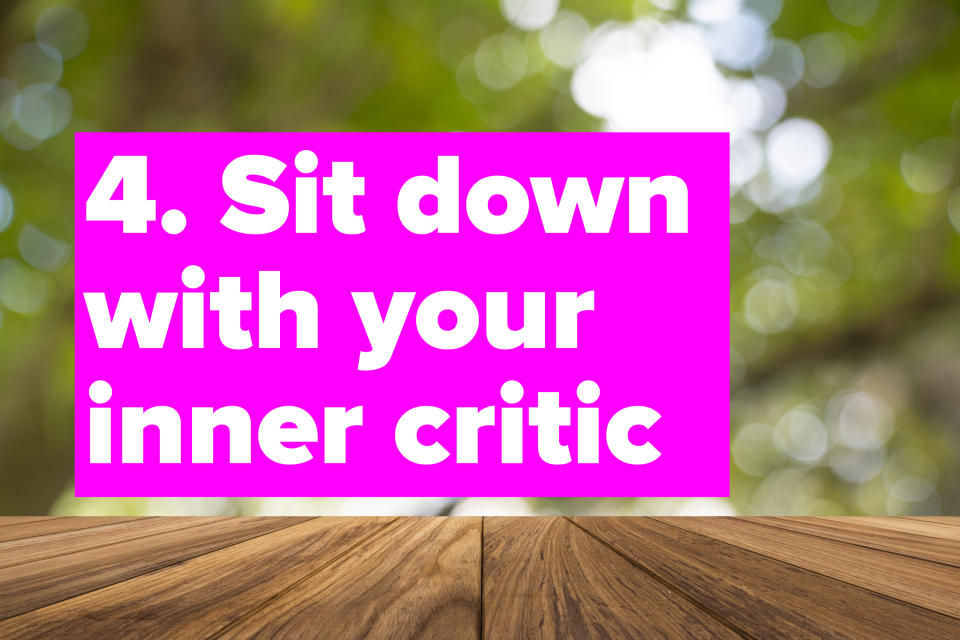
Go get yourself a coffee, or a tea, and get ready for the conversation of your life. While it might seem scary to sit down with your inner critic, becoming friends with them can help you reframe limiting beliefs. Ask them why this is coming up and why they think it’s an issue. It can be helpful to imagine your inner critic as annoying Bob from Accounting, or at least something other than yourself. You’ll be able to take some of the pressure off and see where your beliefs are rooted.
Freeform / Via giphy.com
If you don’t tend to catastrophize, it can also be helpful to ask your inner critic, “What's the worst that could happen?” Sometimes preparing for the worst can help settle you and take some of the pressure off. It’s easy to be hard on ourselves when there’s really no need to be. The worst that could happen if I ask for a raise is my boss says no, and I’m in the same spot as I am now. It can help put things in perspective.
It can also be helpful to sit down with a friend to help you work through worse case scenarios, especially if you’re anything like me and tend to be melodramatic about worst case scenarios. I tend to spiral from “I won’t get the promotion” to “My boss will hate me for asking and will fire me” really quickly. So having another voice in the room to tell me I’m being extra helps with this step.
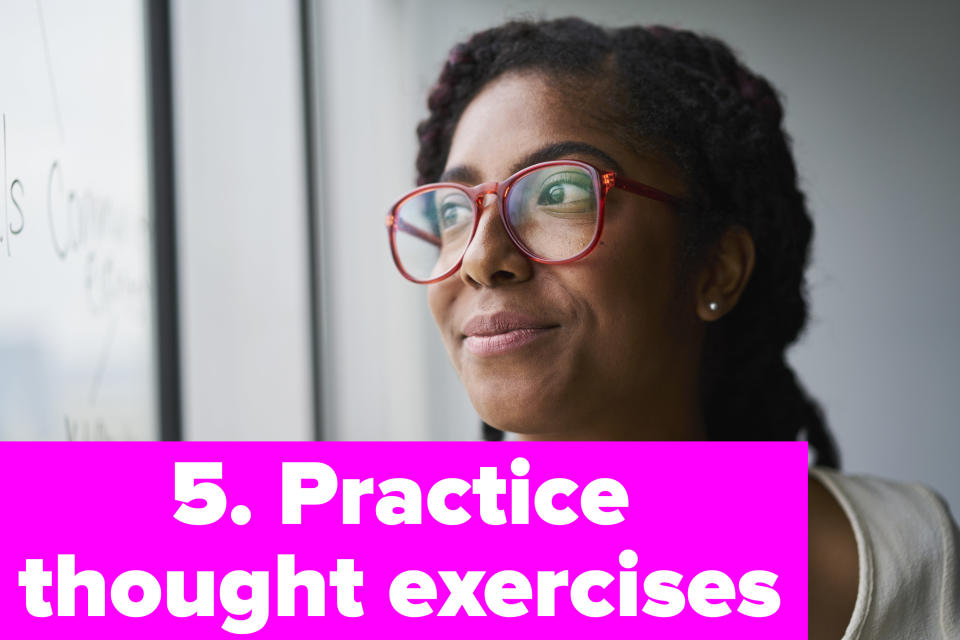
Imagine a really close friend has come to you with their limiting beliefs. What would you tell them?
It can be helpful to take your limiting belief and put it on someone else. Would you be as hard on your bestie as you are on yourself? I know I wouldn’t. This can help give you perspective on your limiting belief and show yourself what you would tell someone else in this scenario. Would you tell your friend to not ask for the raise because it’s not worth the rejection? No, you would encourage them to ask because they deserve it.

A lot of people will tell you to fake it until you make it, but that’s actually terrible advice because it can lead to the idea that you’re a fraud. Instead, ask yourself if you can experiment with an empowering belief. Move forward as if you believe it, even if you still struggle to believe it. Put together a list of reasons why you deserve the raise, and then go ask your boss about it, even if you don’t really feel like you deserve the raise.
That’s not faking it until you make it. You’re still putting in the big prep work to prepare for the meeting with your boss, and you’re bringing the facts. Sometimes it doesn’t matter what the gremlins in your brain are saying — telling them no and experimenting with the empowering belief are what you need to get the work done.

Mel emphasized how important it is to surround yourself with people who are on the same path as you. It can be hard to prioritize saving money over spending money, especially if your limiting belief is that you’re bad at saving money. But if you can find a few friends who are also wanting to prioritize saving money and create a symbiotic relationship where you both encourage each other to make better choices, you’re more likely to make the changes you want to see in yourself.

Mel also encourages her clients to set a timer and imagine as many different outcomes as possible.
The goal for this is to problem solve things that come up with limiting beliefs. She tells her clients to set a timer to push your brain. Pay attention to what obstacles come up, and then figure out ways to solve them.
ABC / Via giphy.com
The goal for this is to problem solve things that come up with limiting beliefs. She tells her clients to set a timer to push your brain. Pay attention to what obstacles come up, and then figure out ways to solve them.
Having those solutions laid out in front of you can help you when limiting beliefs arise, because it gives you a set of contingencies. You’re not doing this on a whim — you’ve thought long and hard and know that you have the skills and the tools to make the transition.
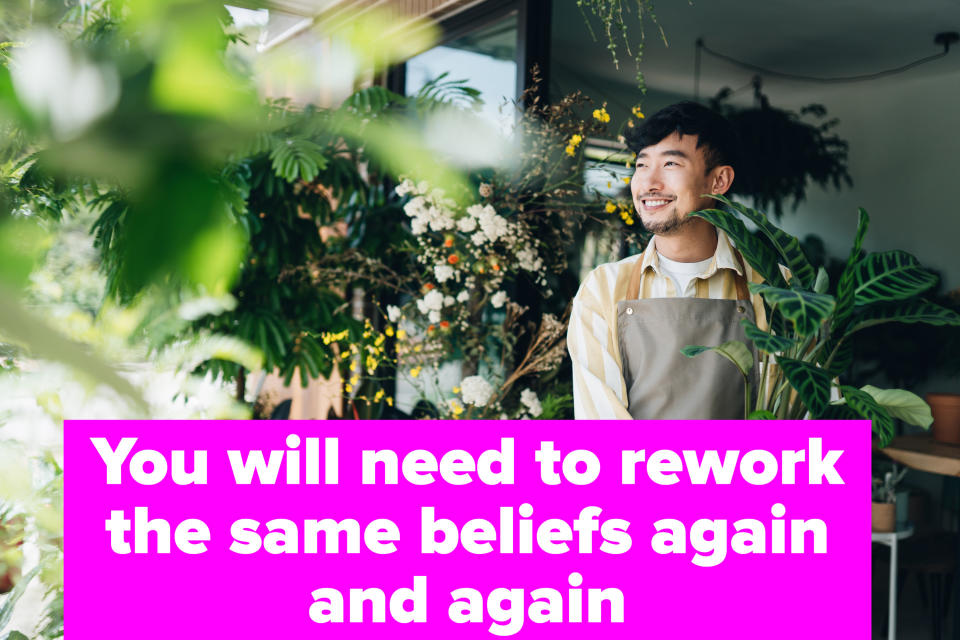
Working through a limiting belief isn’t a one and done scenario. Both Mel and Jess stressed the importance in understanding that this is a process and not a Band-Aid.
Mel reminded me that, “Limiting beliefs still come up, even for successful people. Money is our livelihood, and we’ll always have things come up that make us question ourselves, since it’s tied to our survival instinct.”
But with hard, careful work of questioning those limiting beliefs and reframing them into empowering beliefs, you’ll be able to make great strides. You might start small and build up your tolerance, but that’s OK. The goal is that you’re working on your mindset to create a more well-balanced, happier, healthier you.
Fox / Via giphy.com

